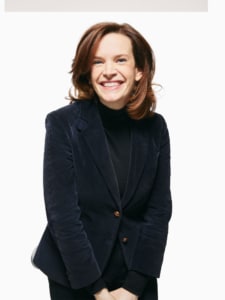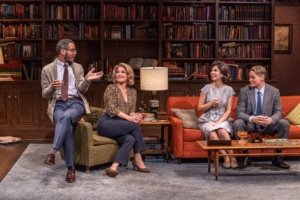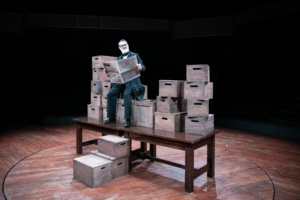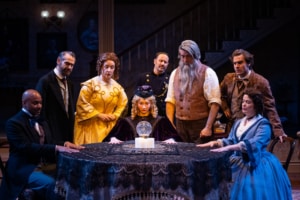DCPA NEWS CENTER
Enjoy the best stories and perspectives from the theatre world today.
Enjoy the best stories and perspectives from the theatre world today.
Less than a year after her Henry Award-winning production of The Lehman Trilogy, Margot Bordelon is returning to the Denver Center Theatre Company (DCTC) to direct the world premiere of Sandy Rustin’s The Suffragette’s Murder. Set in 1857, The Suffragette’s Murder follows the eclectic residents of a New York City boarding house as they try to skirt the law and win women the vote.

Margot Bordelon
Calling in from present-day New York, Bordelon discussed her directorial approach, her unique relationship with the DCTC, and her personal growth as an artist. The following conversation has been condensed and lightly edited for clarity.
You describe yourself as having a penchant for feminist comedies. Why that combination in particular?
I consider myself an ardent feminist. The continuation of women’s rights is one of the things that feels most important to me, as a woman and as a human. And I love to laugh. (laughs) I love anything that packs a political punch. Often the way that we have our minds changed most gracefully is through comedy.
The shows you’ve directed for DCTC — You Lost Me, Who’s Afraid of Virginia Woolf?, The Lehman Trilogy, and now The Suffragette’s Murder — all take place, at least in part, in the past. What appeals to you about shows with historical settings?
Two of those plays were new plays, You Lost Me and now Suffragette’s Murder, both by women, and what is interesting comparing and contrasting those pieces is that they are period pieces, but they are so specifically trying to say something and ask questions about the current moment that we’re living in, politically.
What appeals to me about working on new plays in general is it feels like you’re not having to contend with what you often have to contend with in revivals, and what we certainly contended with in Virginia Woolf — that [in] anything written of a certain time, there’s a certain amount of misogyny, or racism, or homophobia that you’re having to figure out how to manage. Plays that are written today, even if they take place in the past, have a more sophisticated and contemporary point of view about social progress.

Jon Hudson Odom, Kelly McAndrew, Isabella De Souza Moore, and Paul David Story in Who’s Afraid of Virginia Woolf?. Photo by Adams VisCom
How do you approach a new play as compared to a classic?
I think most immediately, both with Bonnie [playwright Bonnie Metzgar] on You Lost Me and with Sandy on Suffragette’s Murder, is that I’m going in as a team with a playwright. We are partners in crime figuring out how this new piece lives in space together.
With a period piece like The Suffragette’s Murder, how do you make it as relevant as possible to a modern audience without coming unglued from the time period in question?
Did you see Emma last year at DCTC? Meredith’s [Emma director Meredith McDonough’s] approach was so fun in that she kind of embraced anachronism in that piece. And there could have been a way to envision this production of Suffragette’s that did that to a certain extent. But it felt really important to Sandy — and this is where the playwright relationship feels so central in a new play — that she really wanted it to feel of the period.
There’s so much within the writing that’s going to have contemporary resonance because she does this really expert job of balancing the suspense and the tension in the piece with the wild physical comedy. But woven throughout all of that are contemporary points of view and themes about racial and gender equality. It’s going to feel relevant to a contemporary audience because she’s bringing in that point of view — while remaining firmly rooted in 1857 New York. We’re not purposefully doing anything anachronistic with the design. We’re trying to stay as true to that time period as possible and just letting the text do the work of making the emotional and political connections.

Matthew Boston as Henry Lehman in The Lehman Trilogy. Photo by Jamie Kraus Photography
Much of The Suffragette’s Murder relies on physical comedy. Are you already choreographing those scenes in your head, or is that something that has to wait until you arrive in the physical space?
I never pre-block anything. I really like to work off actors’ impulses. My kind of M.O. is like, if they know what they want in a scene, if they know their objective and they know the different ways in which they’re going to try to obtain their objective, then the blocking will come organically. But, there are certain moments in [The Suffragette’s Murder] that the scenic designer and I had to really figure out because the play is programmed in the in-the-round space.
So Reid Thompson, who’s my scenic designer, we had storyboarded through key moments, where people will be. And that’s work that we always did. I mean we really extensively did it for Lehman Trilogy because that set was constantly constructing and deconstructing with the crates and the tables and the chairs. I would say maybe we’ve created about 20 different storyboards with the knowledge that once I’m collaborating with the other artists in the space, we’re going to make discoveries and things are going to change. I like to go in at least feeling like I have some kind of idea of what could happen — like I have a proposal for everything — but then also knowing that it’s inevitably going to shift.
Your DCTC directorial debut, You Lost Me, was almost exactly five years ago, on the eve of the Covid lockdown. How have you changed as an artist since then?

The cast of The Suffragette’s Murder. Photo by Jamie Kraus Photography
(sighs) How much time you got? (laughs) It’s a great question for therapy. I’ll just speak really frankly about it. I was grinding so hard before the pandemic — that was my third show that season, and then I was supposed to do two more shows, so five shows in a season. Which really, no freelance director should be doing that because you burn out. What was so funny is that You Lost Me happened, then there was lockdown, and then my first show back was in the same space at DCTC and it was Virginia Woolf. And you know, two years or so had passed.
I hope the way that I’ve changed as an artist is that I’ve allowed myself to slow down more and become more expansive and more compassionate with both myself and my collaborators. (laughs) They’ll have to say whether or not that’s true! I’m still a workhorse. But Covid really put things deeply in perspective, and my work as a theater director was not the work of a first responder. And I continue to feel so strongly about the necessity of storytelling and the necessity of storytelling in real-time with live audiences. That feels deeply important to me. But you know, I’m still freelance directing. I’m still gigging it.
What does a historical comedy let you do that a straight historical drama does not?
It makes me think of the line [in The Suffragette’s Murder], “imagine how grand women will be treated by 1957!” It’s irony. It allows the audience to feel in on something. And maybe there’s something a little bit arrogant about that, that we’re like, “ha ha ha, we’re so much more evolved now.” Whereas 50 years from now — 20 years from now, even — people will look back on this play, look back on other plays, and hopefully so much progress has happened that they’ll feel dated in their own right.
DETAILS
The Suffragette’s Murder
Feb 7 – Mar 9, 2025 • Kilstrom Theatre
Tickets
